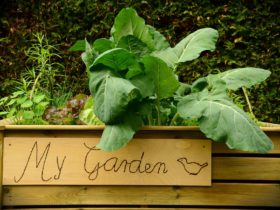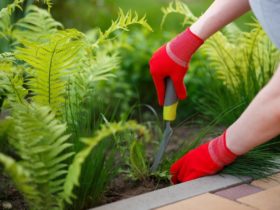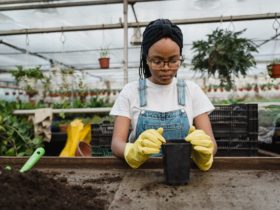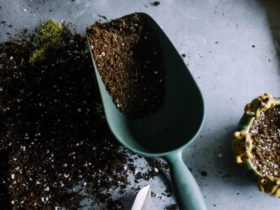Do you have a garden but find gardening stressful? Do you need tips on how to make gardening easier and grow more productive plants? Welcome to “Planting Your Future,” for the A-Z of all your gardening needs. Read this article for some great gardening tips and tricks, and be sure to bookmark this page so you can revisit for future updates!
Tips and Tricks for a Stress-free Gardening Experience

There are so many ways to improve the state of your gardening and your gardening experience. Here, we have created a list of many excellent gardening tips and tricks.
Test your soil
Soil quality determines the plants that will do well in your garden, so it is important to test your soil. Different plants require different soil pHPotential of Hydrogen or pH is a measurement of the acidity or alkalinity of any material. pH is read from 0-14. 0-6.9 is acidic, 7 is neutral, and 7.1-14 is alkaline (or basic), moisture, and nutrients. When you know the type of soil in your garden, you can select from the list of plants that will grow in your soil. You can also mix up your own potting soil or adjust your garden soil for your desired cropCrops are plants cultivated by humans for specific purposes. Crops can be made for food, medicine, flower, etc. Examples of crops are wheat, tomato, cabbage, etc..
Know Where to Plant
Know the locations in your yard that receive the most and least sunlight. Different plants have different sunlight requirements, so this is an important consideration. Plants like Tomatoes need as much as 8 hours of daily sun to grow while herbs like spearmints can grow in partial shade. Find out the sunlight requirement of the plant you want to grow so that you will identify the best location for it in your garden.
Grow Legumes with Your Crops
Legumes are plants that can absorb nitrogen from the ground through their symbiotic relationship with nitrogen-fixing bacteria. Note that these plants do not release the nitrogen into the soil, but through the process of decomposition, the legumes of the previous growing season add nitrogen for other plants to absorb. When the leaves of legume plants rot, scavengers like Earthworms will eat them and excrete nitrogen-rich organicAn organic material is any material derived from plants, animals, fungi, or microbe sources (i.e. living things) and is biodegradable. 'Organic' can also refer to the gardening practice that involve zero use of chemicals as fertilizers, pesticides, etc. Plants grown organically are healthier and produce fruits with more quality. matter into the soil. Decomposers like fungi will make this matter readily absorbable by plants. You can also add legumes to your compostAn organic matter made from decomposed plant materials. Compost is often made from decomposing shredded leaves, hay, fruits, and other plant materials at a ratio of 25 part dry brown materials to 1 part fresh green materials. bins.
Grow Mushrooms
Why grow mushrooms? Here is the fact that many people don’t know about mushroom cultivation; mushrooms are fungi, and fungi are significant decomposers in our environmentThe factors influencing an organism (both internal and external). The surrounding of an organism.. How does this relate to gardening tips and tricks? As decomposers, mushrooms will convert the growing mediumAny material used as substrate for the growth of organisms such as plants, mushrooms, and microbes. Soil is the medium for most plants while a mixture of sawdust and grains is the medium of commercially cultured mushrooms. into a form that is easily absorbed by plants. After harvesting your delicious mushrooms, you will have a cheap, organic fertilizerAny material added into the soil (or sprayed on leaves) to give more nutrients to plants. Fertilizers often give Nitrogen, Phosphorus, and Potassium (NPK) to plants. Fertilizers can be organic or inorganic. that readily releases nutrients to your plants. Mushrooms are also easy to grow and don’t need as much light as plants do. Consider learning how to grow mushrooms.
Dry Your Herbs Quickly
There are many advantages of drying herbs. When you dry your herbs, you increase their shelf life, and they still retain their fragrance and flavor! One way to dry herbs is to place them in the sun. Another way is to put them between paper towels inside your car. Close all the doors and windows. In no time, your herbs will be dry, and your car will smell good, too. When they are dry, store them in glass jars for use during the winter months.
Make Good Use of Friendly Insects

Insects, though scary to many people, are hard workers and perform various ecosystem services like pollinationPollination is the transfer of pollen grains (i.e. plant sperm) from the anther (male) part of a flower to the stigma (female) part of a flower. Some plants such as avocados and maize must be cross-pollinated (i.e. pollen grains moving from one plant to the other). Others like pepper can be self-pollinated (i.e. pollen grains fertilizing flowers from the same plant)., scavenging (therefore quickening decomposition process), preying on other insects, etc. With the help of insects, your garden experience will improve because they do a lot of work for you, freeRefers to structures that are not attached to organs or any structure. For example, a petal free from the calyx. of charge!
Pollinators (Butterflies, Bees, etc.)
Plants that strictly rely on insects for pollination are called entomophilous plants. If you have insect pollinators such as bees, butterflies, and moths in your garden, you will harvest more fruitsFruits are seed-bearing pods or capsules of flowering plants. Fruits are full of nutrients that can enrich germinated seeds. Examples of fruits are tomato, banana, watermelon, and cucumber fruits.. These insects, while feeding on the plant nectar, carry pollen grain (plant version of sperm) from one flower to another. When you have many pollinating insects in your garden, more flowers will are fertilized, resulting in more fruits produced. Introduce some butterflies into your garden (they will also come on their own). They will help improve your garden and look pretty, too.
Predatory Insects (Praying Mantises, Hornets, etc.)
These are insects that eat other insects. They are beneficial to you because they prey on pests in your garden like caterpillars, grasshoppers, etc. Introduce some Praying Mantis into your garden. You won’t even know they are there.
Ladybugs
Ladybugs are predatory insects. They are a biocontrol against aphids (your garden’s worst insect enemies). Aphids can destroy your plants by sucking the sap out of them. Ladybugs eat aphids. Adults lay hundreds of eggs in a colony of aphids. As soon as the larvae hatch, they start to feed on the aphids. Introduce ladybugs into your garden. Their beauty is thrilling to watch.
Scavenging Insects (Ants)
Ants and other scavenging insects not only keep your garden clean by feeding on decaying matter like fallen leaves, dead plants, they also quicken the process of decomposition. Scavengers aren’t decomposers; however, they eat food and excrete in tiny bits. Fungi and other microbes, which are the true decomposers, break down matter faster when it is small. This scavenging-decomposing process is essential for your garden because the process keeps your soil clean and releases nutrients to your plants.
Earthworms for a Better Garden?
Earthworms are the farmer’s best friends. Worms are scavengers, but a notable characteristic of most earthworms is that that they are burrowers. Burrowing aerates the soil so that oxygen can reach the plant’s roots and makes it easier for the roots to spread out. Introduce earthworms into your gardens to grow healthier plants.
Use a Greenhouse
A greenhouse is a building that shelters plants from the cold by trapping greenhouse gases to maintain a higher temperature inside. It is made mostly of transparent material so that light can pass through and help plants to grow. In a greenhouse, you can plant warm-weather or tropical crops in northern climates or start planting earlier in the spring.
Conclusion
Gardening isn’t stressful if you know some of the endless tips and tricks. As this article shows, the best way you can care for your vegetable garden is to allow nature to care for it. Use friendly microbes, insects, and earthworms to make your garden stand out and harvest more produce.
Did you learn something new from this article? How will you improve your gardening? Share your thoughts in the comment section.











Leave a Reply